“Most likely to ask questions.” It’s a superlative Hannah Kline accepted with pride from her peers in the graduating Class of 2024 at Indiana University School of Medicine.
She considers curiosity essential to becoming a transformational physician scientist. On May 10, Kline will graduate with a combined MD/PhD degree — the culmination of an eight-year training program to become a physician scientist. Next, she will start on the research pathway of the general psychiatry residency and child and adolescent psychiatry fellowship at the University of Pittsburgh Medical Center.
As the speaker representing PhD graduates for the Class of 2024, Kline wants to remind her peers to “remain passionately curious” and “keep asking meaningful questions.” That’s the path to scientific discovery.

“As an MD/PhD student, I have the benefit of being at both the bench and bedside, and I want to share what the efforts of our medical science graduates translate to in the medical field,” Kline said. “Those hours spent seeking answers for our questions are worth the changes that we create.”
Kline’s curiosity led her to study substance abuse in adolescent females — a population largely excluded from research. It also led her to explore and address the underlying reasons for a lack of diversity among medical scientists. In both cases, asking “why” led to discoveries and advancements.
“Hannah’s inquisitive and resilient nature, along with an ability to quickly assimilate new information, enabled her to overcome challenges and provide direct answers to novel questions,” said her PhD advisor, Bryan Yamamoto, PhD, who is the Robert B. Forney Professor Emeritus of Toxicology and former chair of the Department of Pharmacology and Toxicology at IU School of Medicine.
Mentorship in medical science
From an early age, Kline equated being a doctor with doing research. Her father, Jeffrey Kline, MD, is an endowed professor and associate chair for research in the Department of Emergency Medicine at Wayne State University School of Medicine in Detroit and formerly held a similar position at IU School of Medicine.
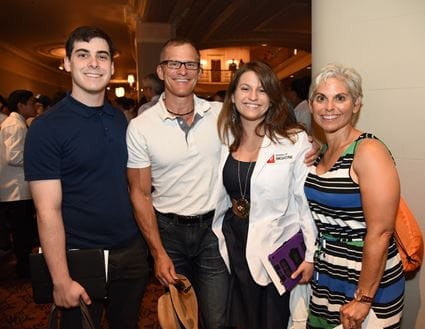 While their fields of interest differ, both Klines have been recognized among their peers with awards bearing the name of former IUPUI Chancellor Charles R. Bantz. Jeffrey Kline received the 2014 Bantz-Petronio Translating Research into Practice Award for his transformational work in diagnosing and treating pulmonary embolism. Six years later, his daughter received the 2020 Charles R. Bantz Award for Excellence, designating her as the top graduate student among the IUPUI Elite 50, based on her leadership, scholarly work and community engagement.
While their fields of interest differ, both Klines have been recognized among their peers with awards bearing the name of former IUPUI Chancellor Charles R. Bantz. Jeffrey Kline received the 2014 Bantz-Petronio Translating Research into Practice Award for his transformational work in diagnosing and treating pulmonary embolism. Six years later, his daughter received the 2020 Charles R. Bantz Award for Excellence, designating her as the top graduate student among the IUPUI Elite 50, based on her leadership, scholarly work and community engagement.
“My trophy is a little bigger,” noted Hannah.
Throughout her time at IU School of Medicine, she has been involved in initiatives to promote and improve the Medical Scientist Training Program (MSTP). As president of the MSTP Combined Degree Student Council, she established mentorship and diversity programs to increase support and create new learning opportunities for students in the program.
In 2023, she was inducted into the Gold Humanism Honor Society, a prestigious, peer-nominated honor recognizing students and physicians who are exemplars of compassionate patient care. Kline also served as president and social chair for the Psychiatry Student Interest Group and co-founded the MSTP Social Committee, launching efforts to connect new students with research opportunities and faculty mentors.
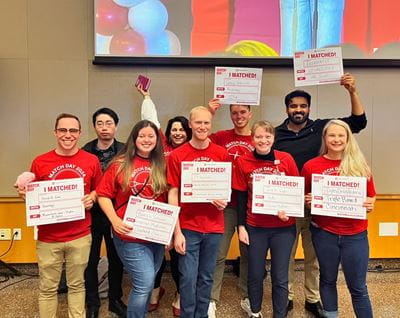 In 2022, Kline founded the MSTP Diversity, Equity and Inclusion Board at IU School of Medicine to address bias, advance recruitment among underrepresented populations and support student advocacy. Kline also started up a mentorship network for high school students in Indianapolis Public Schools and undergrads at IU Indianapolis in hopes of inspiring a diverse group of students to consider careers in medical science. As lead mentor for Growth Through Guidance Mentorship, Kline secured faculty buy-in and funding for summer research experiences where students work directly with their MSTP mentors in the lab.
In 2022, Kline founded the MSTP Diversity, Equity and Inclusion Board at IU School of Medicine to address bias, advance recruitment among underrepresented populations and support student advocacy. Kline also started up a mentorship network for high school students in Indianapolis Public Schools and undergrads at IU Indianapolis in hopes of inspiring a diverse group of students to consider careers in medical science. As lead mentor for Growth Through Guidance Mentorship, Kline secured faculty buy-in and funding for summer research experiences where students work directly with their MSTP mentors in the lab.
“As MD/PhD students, we’re here for eight years, so we can offer pretty long-term mentorship with shadowing experiences and research opportunities,” Kline said. “It’s become a pipeline program. I’m proud that it’s something that can continue after I’m gone.”
Brittney-Shea Herbert, PhD, assistant dean for physician scientist development at IU School of Medicine, said Kline is knowledgeable, empathetic, communicative and patient in all she does.
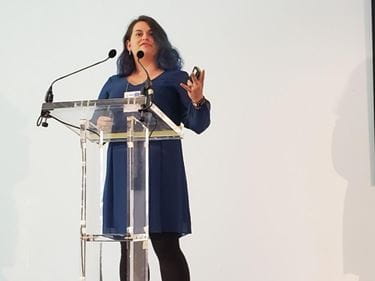
“She has a can-do attitude and a cheery presence, a love of lifelong learning, and is committed to the personal growth and success of those she mentors,” Herbert said.
Through Kline’s mentorship, IU Indianapolis student Hillarie Arellano gained confidence in her ability to become a medical scientist; she plans to apply to the MD/PhD program at IU School of Medicine.
“I am genuinely grateful for Hannah's responsiveness and readiness to provide helpful information, including the occasional pep talk,” Arellano said. “Her connections have led me to exceptional shadowing and research positions, enhancing my future application. Her depth of knowledge and unwavering passion for helping others is simply extraordinary.”
Exploring addiction in adolescent females
On her own journey to becoming a physician scientist, Kline has been inspired and mentored by Leslie Hulvershorn, MD, chair of the Department of Psychiatry. The two share an interest in researching adolescent addiction.
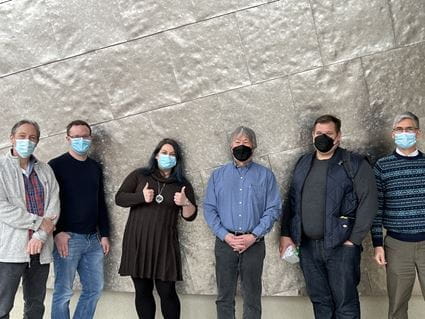
“Dr. Hulvershorn has done a ton of translational research as a clinical scientist in psychiatry, and she’s given me a lot of career advice,” Kline said.
Kline’s interest in adolescent addiction was piqued years ago when she read “Go Ask Alice,” an anonymous memoir of a teen girl’s substance abuse and failed rehab attempts. It made Kline curious to know why an effective treatment doesn’t exist for substance use disorder. After digging into medical literature, Kline discovered women have been excluded from most behavioral neuroscience research.
“Old biases said you can’t track female behavior because of menstrual cycles — because that makes them erratic,” Kline said. “I didn’t like that. It excludes half the population from scientific research and discovery.”
So, she set out to explore methamphetamine and alcohol use in adolescent girls.
“Neurobiological factors that underly substance use metabolism, risk and pathophysiology likely differ substantially between males and females, yet we know very little about these differences,” Hulvershorn said. “Hannah’s work aims to fill in some of those gaps, opening the door for sex-specific, personalized treatments for these devastating disorders.”
Hulvershorn and Yamamoto see promise in Kline’s discoveries, including animal research identifying an inflammatory pathway in the adolescent female brain activated by drinking alcohol. Moreover, they appreciate Kline’s enthusiasm for inspiring others to become medical scientists.
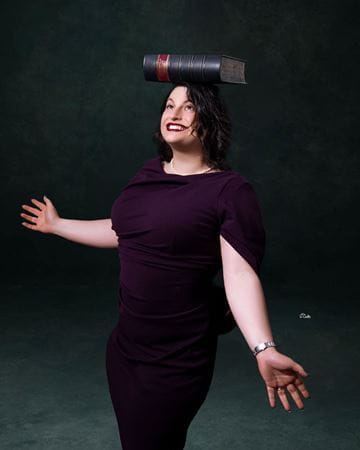 “Hannah is not intimidated by an academic career, and she is interested in a well-balanced life,” Hulvershorn said. “We desperately need more physician scientists in psychiatry, and so I hope all the bright, inquisitive scientists follow Hannah’s lead.”
“Hannah is not intimidated by an academic career, and she is interested in a well-balanced life,” Hulvershorn said. “We desperately need more physician scientists in psychiatry, and so I hope all the bright, inquisitive scientists follow Hannah’s lead.”
Kline said she senses “we’re in a golden age of psychological research.”
“We have an army of young grad students who are coming in with creative ideas and finding problems and solutions,” she said. “I’m really excited. It’s like investing in Apple in 1980. I’m getting in on the ground floor as a scientist in the discovery process of new solutions for patients.”
Her message to fellow graduates is to “leave the imposter syndrome behind” and recognize the value of the expertise they’ve gained as medical scientists. “All of us are impressive and have done cool, groundbreaking research,” Kline said. “We are all on the cutting edge of science — 100% of treatments that exist would not exist, if not for researchers like us. Grad students on the front lines come up with good questions and good ideas to address big problems, and then work with their mentors to solve them.
“Keep asking meaningful questions, and find ways to add to that monument of shared foundational knowledge in medical science.”
